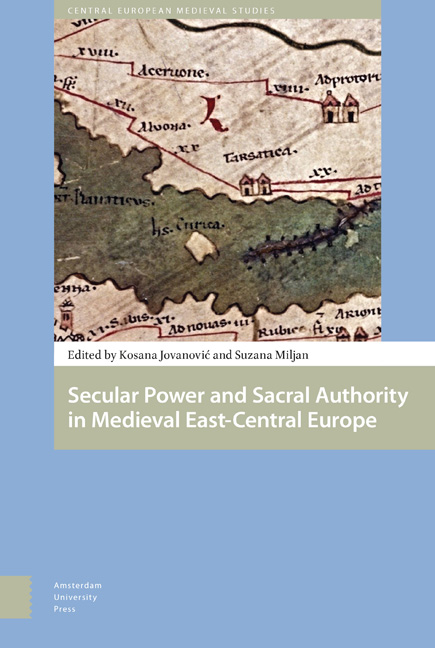Book contents
- Frontmatter
- Contents
- List of Figures and Tables
- Acknowledgements
- Foreword
- Folklore of the Medieval Kings of Hungary: Preliminary Research Report
- Variations on Nobility in Central and South-Eastern Europe: An Introduction
- The Changes of Office of Ban of Slavonia after the Mongol Invasion in Hungary (1242-1267)
- The Reconstruction and Role of Roads in the Formation of a Medieval Cultural Landscape: The Example of Episcopal Estates of Dubrava, Ivanić and Čazma
- From Castle-Warrior to Nobleman: Case Study of a Family of Slavonian Lesser Nobility
- Late Medieval Village in Turopolje (Slavonia): The Example of Donja Lomnica
- Economic Development and Transformation of the Pauline Monasteries near Senj under the Frankapan Patronage
- The Society of the Noble Judges in Northeastern Hungary during the Reign of King Sigismund (1387-1437)
- Development of Ragusan Diplomatic Service in the First Half of the Fifteenth Century: Father and Son at the Court of Duke Sandalj Hranić
- Croatian Students at the University of Prague in the Fifteenth Century
- A Contribution to Medieval Croatian Diplomatics: Cyrillic Charters of Croatian Nobility from the Franciscan Monastery on Trsat in Rijeka
- Peter of Crkvica, a Man Who Could Be Trusted: The Career of a Middle-Ranking Cleric and Diplomat in the Kingdom of Hungary in Mid-Fifteenth Century
- The Nobility of the Despotate of Serbia between Ottoman Empire and Hungary (1457-1459)
- List of Contributors
- Index
The Nobility of the Despotate of Serbia between Ottoman Empire and Hungary (1457-1459)
Published online by Cambridge University Press: 12 December 2020
- Frontmatter
- Contents
- List of Figures and Tables
- Acknowledgements
- Foreword
- Folklore of the Medieval Kings of Hungary: Preliminary Research Report
- Variations on Nobility in Central and South-Eastern Europe: An Introduction
- The Changes of Office of Ban of Slavonia after the Mongol Invasion in Hungary (1242-1267)
- The Reconstruction and Role of Roads in the Formation of a Medieval Cultural Landscape: The Example of Episcopal Estates of Dubrava, Ivanić and Čazma
- From Castle-Warrior to Nobleman: Case Study of a Family of Slavonian Lesser Nobility
- Late Medieval Village in Turopolje (Slavonia): The Example of Donja Lomnica
- Economic Development and Transformation of the Pauline Monasteries near Senj under the Frankapan Patronage
- The Society of the Noble Judges in Northeastern Hungary during the Reign of King Sigismund (1387-1437)
- Development of Ragusan Diplomatic Service in the First Half of the Fifteenth Century: Father and Son at the Court of Duke Sandalj Hranić
- Croatian Students at the University of Prague in the Fifteenth Century
- A Contribution to Medieval Croatian Diplomatics: Cyrillic Charters of Croatian Nobility from the Franciscan Monastery on Trsat in Rijeka
- Peter of Crkvica, a Man Who Could Be Trusted: The Career of a Middle-Ranking Cleric and Diplomat in the Kingdom of Hungary in Mid-Fifteenth Century
- The Nobility of the Despotate of Serbia between Ottoman Empire and Hungary (1457-1459)
- List of Contributors
- Index
Summary
From 1402 to 1459 the state of the despots of Serbia had the role of a buffer zone between Hungary and the Ottoman Empire; its rulers being usually the vassals of both Ottoman sultans and kings of Hungary. That became obvious especially after the death of Despot George Branković in December 1456. The role of the nobility in the forthcoming period was significant because it constituted the largest part of Serbian army. Successor to Despot George, his son Despot Lazarus (1456-1458), set his heart on concluding a peace agreement with Sultan Mehmed II (1451-1481). His emissaries achieved that goal on 15 January at the Ottoman Porte. According to this treaty, the Serbian ruler had to pay 40.000 ducats annually to the Sultan and this tax was known as kharaj. However, this was less than during the reign of Despot George, as the Ottomans in 1455 had conquered the Southern part of the Serbian state including the rich mining town of Novo Brdo. Sources do not mention the obligation of sending auxiliary troops. Nevertheless, it is certain that Despot Lazarus was supposed to do so and the same did his predecessors. The noblemen were a majority of this kind of army. On the other side the new Serbian despot was embroiled in conflicts within the Kingdom of Hungary, which was the consequence of the murder of his cousin Ulrich II Cilli. He supported King Ladislas V (1440-1457) against the Hunyadi. With the assistance of royal supporters, Despot Lazarus occupied Kovin (Kewe), Laslovar, Haram, Požežena and Dombo, the towns in south-western Banat in the April 1457. The advance of the Serbian army through Banat ended on 25 May, when it was defeated by the Hunyadi's troops. Despite being repressed, the Serbian ruler kept control over the mentioned towns on the left bank of the River Danube until his death. Simultaneously, the Brankovići were experiencing some inner disputes. The first disagreement broke out between Irene, the widow of Despot George, and Despot Lazarus. Gregory, oldest son of Despot George, who was blind, provided the support for his mother. During this conflict, Irene died on 3 May 1457 in the town of Rudnik. Afterwards, her brother Thomas and her children, Gregory and Mary, left Serbia to come to the Sultanate.
- Type
- Chapter
- Information
- Publisher: Amsterdam University PressPrint publication year: 2018



